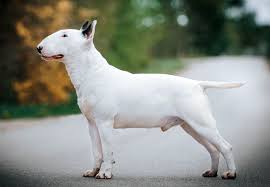
Bull Terrier
Conditions of detention
Bull Terriers adapt well to various living conditions, from apartments to houses with yards. They require regular exercise and mental stimulation to prevent boredom and destructive behavior.
Useful Fact: Despite their adaptability, Bull Terriers thrive best in environments where they have space to play and exercise daily
Nutrition and diet
Bull Terriers need a balanced diet rich in protein, healthy fats, and essential nutrients. High-quality commercial dog food or a carefully planned homemade diet can meet their nutritional needs.
Useful Fact: Overfeeding can lead to obesity, so it is crucial to monitor their weight and adjust food portions accordingly.
Health
Bull Terriers are generally healthy but can be prone to certain conditions such as deafness, skin allergies, and kidney disease. Regular vet check-ups are essential to maintain their health.
Useful Fact: White Bull Terriers are more prone to deafness, so it’s important to have their hearing tested early.
Grooming and care
Bull Terriers have short, dense coats that require minimal grooming. Regular brushing will help keep their coat healthy and reduce shedding.
Useful Fact: Their short coat makes them more sensitive to extreme temperatures, so they may need extra protection in very cold or hot weather.
Education and training
Bull Terriers are intelligent but can be stubborn. Consistent, positive reinforcement training works best, starting from a young age.
Useful Fact: Socialization and obedience training are crucial to prevent behavioral issues and ensure they grow into well-mannered adults.
Toys and entertainment
Bull Terriers are energetic and enjoy interactive toys that challenge their minds and keep them physically active. Durable chew toys, puzzle toys, and fetch toys are ideal.
Useful Fact: Providing a variety of toys can help prevent boredom and destructive behavior.
Safety
Bull Terriers are curious and active, so ensuring a safe environment is essential. Secure fencing, safe chew toys, and supervision around water are important.
Useful Fact: Due to their strong prey drive, Bull Terriers should be kept on a leash or in a secure area when outdoors.
Accessories
Essential accessories for Bull Terriers include a sturdy collar and leash, a comfortable bed, food and water bowls, and grooming tools like brushes.
Useful Fact: A harness can be a better option than a collar for walks, as it provides more control and reduces strain on their neck.
Socialization
Early socialization with different people, environments, and other animals is crucial for Bull Terriers. It helps them develop into well-adjusted, confident adults.
Useful Fact: Regular socialization activities can prevent aggression and anxiety in Bull Terriers.
Travel and Transportation
Bull Terriers can travel well if accustomed to it from a young age. Secure them in a crate or with a dog seatbelt for car travel, and ensure they have proper identification.
Useful Fact: Familiarizing your Bull Terrier with car rides and travel environments can make trips less stressful for both the dog and owner.
Behavior and psychology
Bull Terriers are known for their playful and affectionate nature. They can be strong-willed and need consistent leadership from their owners.
Useful Fact: Mental stimulation through training and interactive play is essential to keep them happy and well-behaved.
Legal aspects
Some regions have breed-specific legislation that may affect Bull Terrier ownership. It is important to check local laws and regulations regarding their ownership and care.
Useful Fact: Being aware of and complying with local breed-specific laws can prevent legal issues and ensure the safety of your Bull Terrier.


